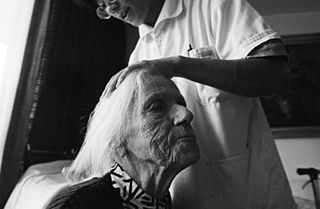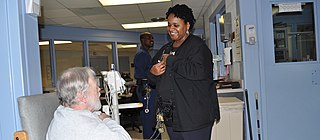
Home care is supportive care provided in the home. Care may be provided by licensed healthcare professionals who provide medical treatment needs or by professional caregivers who provide daily assistance to ensure the activities of daily living (ADLs) are met. In-home medical care is often and more accurately referred to as home health care or formal care. Often, the term home health care is used to distinguish it from non-medical care, custodial care, or private-duty care which refers to assistance and services provided by persons who are not nurses, doctors, or other licensed medical personnel. For terminally ill patients, home care may include hospice care. For patients recovering from surgery or illness, home care may include rehabilitative therapies.

A nursing home is a facility for the residential care of elderly or disabled people. Nursing homes may also be referred to as skilled nursing facility (SNF), long-term care facilities, old people's homes, assisted living facilitiescare homes, rest homes, convalescent homes or convalescent care. Often, these terms have slightly different meanings to indicate whether the institutions are public or private, and whether they provide mostly assisted living, or nursing care and emergency medical care. Nursing homes are used by people who do not need to be in a hospital, but cannot be cared for at home. The nursing home facility nurses have the responsibilities of caring for the patients' medical needs and also the responsibility of being in charge of other employees, depending on their ranks. Most nursing homes have nursing aides and skilled nurses on hand 24 hours a day.
An assisted living residence or assisted living facility (ALF) is a housing facility for people with disabilities or for adults who cannot or who choose not to live independently. The term is popular in the United States, but the setting is similar to a retirement home, in the sense that facilities provide a group living environment and typically cater to an older adult population. There is also Caribbean assisted living, which offers a similar service in a resort-like environment.
In healthcare, an orderly is a hospital attendant whose job consists of assisting medical and nursing staff with various nursing and medical interventions. The highest role of an orderly is that of an operations assistant. An operations assistant requires people who are knowledgeable in advanced medical terminology and assist with specialist surgery setups, and typically an operations assistant understands more about surgical procedures than does a registered nurse working outside of theatres. An operations assistant is a direct assistant to consultant-level doctors more than to nurses. These duties are classified as routine tasks involving no risk for the patient.
A licensed practical nurse (LPN), in much of the United States and Canada, is a nurse who cares for people who are sick, injured, convalescent, or disabled. In the United States, LPNs work under the direction of physicians, mid-level practitioners, and may work under the direction of registered nurses depending on their jurisdiction.

A nurse practitioner (NP) is an advanced practice registered nurse and a type of mid-level practitioner. NPs are trained to assess patient needs, order and interpret diagnostic and laboratory tests, diagnose disease, formulate and prescribe treatment plans. NP training covers basic disease prevention, coordination of care, and health promotion, but does not provide the depth of expertise needed to recognize more complex conditions.
Matron is the job title of a very senior or the chief nurse in several countries, including the United Kingdom, the Republic of Ireland and other Commonwealth Country's and former administrative colonies.
Originated in 1969 by staff nurses at the University of Minnesota, Primary Nursing is a system of nursing care delivery which emphasizes continuity of care and responsibility acceptance by having one registered nurse (RN), often teamed with a licensed practical nurse (LPN) and/or nursing assistant (NA), who together provide complete care for a group of patients throughout their stay in a hospital unit or department. While the patient is on the nurses' unit, the primary nurse accepts responsibility for administering some and coordinating all aspects of the patient's nursing care, with the support of other members of the nursing staff. This results in the nurse having greater insight into the patient's condition, both medical and emotional.
Nursing management consists of the performance of the leadership functions of governance and decision-making within organizations employing nurses. It includes processes common to all management like planning, organizing, staffing, directing and controlling. It is common for registered nurses to seek additional education to earn a Master of Science in Nursing or Doctor of Nursing Practice to prepare for leadership roles within nursing. Management positions increasingly require candidates to hold an advanced degree in nursing.

Gerontological nursing is the specialty of nursing pertaining to older adults. Gerontological nurses work in collaboration with older adults, their families, and communities to support healthy aging, maximum functioning, and quality of life. The term gerontological nursing, which replaced the term geriatric nursing in the 1970s, is seen as being more consistent with the specialty's broader focus on health and wellness, in addition to illness.

The White House Medical Unit (WHMU) is a unit of the White House Military Office and is responsible for the medical needs of White House staff and visitors. The unit also provides medical care to the President, the Vice President, their families, and international dignitaries visiting the White House.

Nursing is a profession within the health care sector focused on the care of individuals, families, and communities so they may attain, maintain, or recover optimal health and quality of life. Nurses may be differentiated from other health care providers by their approach to patient care, training, and scope of practice. Nurses practice in many specialties with differing levels of prescription authority. Nurses comprise the largest component of most healthcare environments; but there is evidence of international shortages of qualified nurses. Many nurses provide care within the ordering scope of physicians, and this traditional role has shaped the public image of nurses as care providers. Nurse practitioners are nurses with a graduate degree in advanced practice nursing. They are however permitted by most jurisdictions to practice independently in a variety of settings. Since the postwar period, nurse education has undergone a process of diversification towards advanced and specialized credentials, and many of the traditional regulations and provider roles are changing.

A hospital is a health care institution providing patient treatment with specialized health science and auxiliary healthcare staff and medical equipment. The best-known type of hospital is the general hospital, which typically has an emergency department to treat urgent health problems ranging from fire and accident victims to a sudden illness. A district hospital typically is the major health care facility in its region, with many beds for intensive care and additional beds for patients who need long-term care. Specialized hospitals include trauma centers, rehabilitation hospitals, children's hospitals, seniors' (geriatric) hospitals, and hospitals for dealing with specific medical needs such as psychiatric treatment and certain disease categories. Specialized hospitals can help reduce health care costs compared to general hospitals. Hospitals are classified as general, specialty, or government depending on the sources of income received.
Total care is where long-term care facilities for residents are responsible for meeting all the needs of a resident. While some residents receiving so-called total care may be able to independently meet all or some of their needs for their activities of daily living without the assistance of a caregiver, the facility and its staff have the duty of monitoring the resident to be sure s/he is having those needs met.

The Utah State Hospital (USH) is a mental hospital located in eastern Provo, Utah, United States of America. The current superintendent is Dallas Earnshaw.
Unlicensed assistive personnel (UAP) are paraprofessionals who assist individuals with physical disabilities, mental impairments, and other health care needs with their activities of daily living (ADLs). UAPs also provide bedside care—including basic nursing procedures—all under the supervision of a registered nurse, licensed practical nurse or other health care professional. UAPs must demonstrate their ability and competence before gaining any expanded responsibilities in a clinical setting. While providing this care, UAPs offer compassion and patience and are part of the patient's healthcare support system. Communication between UAPs and registered nurses (RNs) is key as they are working together in their patients' best interests. The scope of care UAPs are responsible for is delegated by RNs or other clinical licensed professionals.
As of 2017, approximately 1.4 million Americans live in a nursing home, two-thirds of whom rely on Medicaid to pay for their care. Residential nursing facilities receive Medicaid federal funding and approvals through a state health department. These facilities may be overseen by various types of state agency.
Post-Hospitalist Medicine is the discipline concerned with the medical care of patients residing in Post-Acute, Long-Term Care, Rehabilitation and Assisted Living Facilities. The Physicians whose primary professional focus is the post-hospital medical care of these patients are called Post-Hospitalists.
Community nursing is nursing care delivered outside acute hospitals, for example in the home, within General Practice facilities, in community hospitals, in police custody, at a school or in a care home. In the UK, a community nurse needs a degree approved by the Nursing and Midwifery Council, as well as 1–2 years’ experience as a qualified Adult Nurse.

Correctional nursing, sometimes called forensic nursing, is a specialized field of nursing that involves caring for the medical and mental health needs of detainees and inmates. These nurses work in a variety of settings such as jails, prisons, and juvenile detention centers. In these correctional settings, nurses are the primary healthcare providers. These nurses also work with victims and assist in expert witness testimonies and are involved in a variety of legal cases including paternity disputes and workplace injuries.










